Anders Dunker: Rediscovering Earth
May 18, 2021 by David
Filed under Non-Fiction, WritersCast
 Rediscovering Earth: Ten Dialogues on the Future of Nature – conversations with Anders Dunker – OR Books – 9781682195086 – Paperback – 240 pages – $23 – ebook versions available at lower prices
Rediscovering Earth: Ten Dialogues on the Future of Nature – conversations with Anders Dunker – OR Books – 9781682195086 – Paperback – 240 pages – $23 – ebook versions available at lower prices
Thinking about how to think about climate, earth, humans on it, and the future, are major challenges for all of us who care about the future of our planet. It may be that most of us alternate between despair and rage, and even with an optimist’s outlook, we have trouble dealing with the sheer scope of what is happening to our surroundings (I think using the words “environment” and “earth” and “planet” has now become counterproductive).
I am constantly searching for writing, whether it is in books, online or in magazines, that will offer me constructive perspectives, different and hopefully better conceptual frameworks than those we have developed, toward making it possible to be both continually engaged and continually energized. I don’t usually feel I can do that on my own.
Anders Dunker’s collection of conversations with some of the deeper thinkers about the future and us in it, turns out to be very useful. The diverse viewpoints, the language of thoughtfulness and care, the commitment to inquiry, are all inspiring elements of this short book. And with such a diverse set of outlooks, it is possible to not lose sight of the core reason for this book to exist – to inspire hope.
Dunkers poses this question: “if we know that we are destroying the planet, our habitat, why do we continue to do it?” His dialogues attempt to investigate this question, and thereby come to some sense of how we might go forward, not ourselves alone, but the nature that we rely on, together.
This is the challenge we face right now. The challenge will be different in a few years, the unfolding story will force a reckoning. For now, those who read the stories in Rediscovering Earth will be able to come to a better sense of what we can and must do together in this moment.
Dunkers proposes that our future, nature itself, will be based on how we navigate the realm of culture, including philosophy, art and literature, the groundwork of our being, as much as or more than in scientific and technological matters. In order to act, we must redefine ourselves, become truly planetary citizens, and recognize how we are all connected, and then act upon, from that, understanding.
We had a terrific conversation, not only about the book and the contributors to it, but about how we will uncover the future and live in it together. A very hopeful experience. I came away from our talk fully energized, and feeling stronger.
Anders Dunker bio (from his website): Born in Norway, raised in the countryside in a family much dedicated to wildlife and nature. Educated in humanistic subjects and Cultural History at the University of Oslo, with Philosophy, Comparative Religion and Comparative Literature as main subjects. Teacher of Aesthetics and other subjects at the University of Oslo, Philosophy and Cultural History in Rome and Barcelona.
Senior lecturer at Kulturakademiet (Norwegian private college) for 10 years, now writer for acclaimed Norwegian & international newspapers and magazines (Le Monde diplomatique, LA Review of Books, NyTid, Vagant, Samtiden, Modern Times Review, Agora). Board member of the Norwegian Writers’ Climate Campaign,
Series Editor of Futurum Collection at Existenz Publisher (Norway) and Editorial Board Member at Technophany, a journal for Philosophy and Technology.
His current book projects include an essay on the future as seen from California and a volume on Peter Sloterdijk’s philosophy. Anders currently lives with his wife, an environmentalist and animalist singer, in Los Angeles, California. He is also a plein air painter.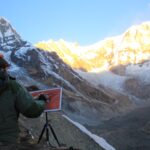

From Dialogue One: “The Rediscovery of the Earth—with Bruno Latour”
Anders Dunker (AD): Historically, the age of discovery is over. Are we none the less in a new age—an age of rediscovery—that can lift our spirits and propel us past the nagging feelings of tragedy?
Bruno Latour (BL): Well, it is my way of being optimistic. It is my way of not taking part in the sense of doom. Scientifically and technically, it is perfectly rational to be a pessimist, but I don’t think it makes much sense politically. Optimism has nothing to do with technoscience—DNA plus cognitive science plus robots plus outer space. Instead it is connected with exploring the world we thought we knew. I will borrow the term from you and call our time period an age of rediscovery, even if it is grandiose. What we call local has quite a different meaning in relation to Gaia than it previously had. It now has many different dimensions. The rediscovery of a place is in some ways a cliché—since ecologists have been talking about the same thing for years—but this concept also leads to a different way of framing the world, it leads to another geometry, so to speak. Water gets another meaning. Ice gets another meaning. Industry is considered in relation to the amount of CO₂ in the atmosphere. We see things in new ways. Antibiotics have a different kind of globalization than weeds, for example.
AD: Traditionally, the concept of the local has had a flavor of subjectivity—existence circumscribed by the immediate horizon—in contrast to the scientific gaze, which purports to see everything as if from outer space?
BL: And here lies the error. The local is objective. The gaze from inside the critical zone is completely objective, it is just objective in a different way. What we see is real, but this reality only becomes visible if we learn what different parties are up to, what they need, what they want, what they can accomplish.
Buy the book directly from the publisher, OR Books.
Podcast: Play in new window | Download
Douglas Rushkoff: Present Shock: When Everything Happens Now
September 21, 2013 by David
Filed under Non-Fiction, WritersCast
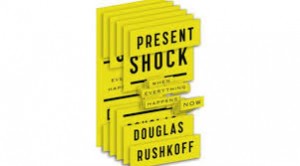 978-1591844761 – Current – Hardcover – $26.95 (ebook versions available at lower prices, and paperback edition due February 2014)
978-1591844761 – Current – Hardcover – $26.95 (ebook versions available at lower prices, and paperback edition due February 2014)
“If the end of the twentieth century can be characterized by futurism, the twenty-first can be defined by presentism.”
As it happens, I started this Writerscast project as an antidote to my own sense of what Douglas Rushkoff calls Present Shock, which is about how time, technology, attention, human intelligence, culture, meaning, advertising, commerce and belief systems that mark 21st century modern life have changed the way we experience our lives. This is an important book that having read and thought about, I can highly recommend.
What is ironic is that all of the things about our time that Rushkoff talks about in Present Shock, our feeling of being too busy and overwhelmed with input, our inability to filter out what does not matter to us and to focus on what does matter most are all the reasons why so many people I know will end up not reading this book at all. In fact the author felt those same issues during the writing of the book, and had to devise a plan and method that allowed him to concentrate on getting the work done.
You are not alone if you are feeling the need to make some space for yourself. It took me much longer to read this book than it would have some years ago. And it took me much longer to find the space in my life to write this short piece and post it than I am comfortable with. Technology in communication has enabled tremendous gains for many of us, while at the same time enslaving us to our devices.
Rushkoff brilliantly describes what has happened to us – the end of narrative, changes in the way we perceive and operate in time, what he calls digiphrenia – mental chaos provoked by digital experience – our need to escape the present, and our inability to filter information and sensory input. We instinctively know what he is talking about because we experience it ourselves every day.
But most of the time, most of us believe all of these concerns are personal and individual – how do I learn how to cope with the modern world? I think Rushkoff’s point in this book is that these are not individual problems, they are structural, and we need to start thinking about ways we can alter the course of our culture, to take control of technology, to act rather than be acted upon. In that way, this is an inspiring book, which I hope will lead to change in thinking and behavior.
I interviewed Doug about one of his earlier books, Program or Be Programmed. He is a terrific talker as well as writer and I am sure you will enjoy listening to our conversation. 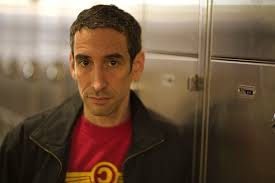
Podcast: Play in new window | Download
Dale Pendell: The Great Bay: Chronicles of the Collapse
August 21, 2010 by David
Filed under Fiction, WritersCast
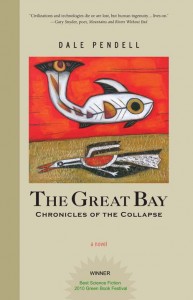 978-1556438950 – North Atlantic Books – Hardcover – $21.95
978-1556438950 – North Atlantic Books – Hardcover – $21.95
This is an amazing novel. Consider it a work of “ecological science fiction” as some have called it. I found it captivating, terrifying, incredibly emotive and reading it becomes almost a spiritual exercise. Pendell posits a worldwide collapse of population from a biological war gone amok. More than 95% of humanity disappears, almost overnight. He actually does not spend much time on this part of the story, horrific as it is, because that catastrophe is really just the lead in for the much bigger story of what happens next.
Aside from the critical principle of understanding, that modern human society will simply collapse, that going back to prior technologies becomes impossible because people no longer have the knowledge or skills, to live the way our ancestors did, and critically, cannot relearn them overnight in the face of societal collapse, the central tenet of this novel is that climate change will have been unleashed by what modern society *has already done* to the natural world. The computer models of planetary climate change are simply not able to fully contain and predict the massiveness of what is about to happen to the planet and the natural world that inhabits it.
The novel is essentially a brilliant imagining of what might or could be the future of the planet over the next hundreds, thousands of years, based on the supposition that humans have already begun this process of change. It’s a rich set of interlocking stories, mostly focused on the area that is known today as California, a bio-geographic landscape that author Pendell knows well, and imagines changing in profound and sometimes painful ways for the reader of his story.
This is a very unusual novel – really the main character is the planet and there are no traditional heroic human characters at its center. While we might search for and find labels for it (“dystopian” or “utopian,” “science fiction” or even “parable”), I’d rather think of it as a kind of vision-telling, a myth in the making, that seeks to change the way we think about ourselves. Indeed, there is a great deal of suffering and difficulty in the book, and at the same time, a powerful sense of continuity, what truly sustains. As the great poet Gary Snyder (who is a fictionalized character in the book, as it happens), says about the novel: “Civilizations and technologies die or are lost, but human ingenuity–families, tribes, and villages, the musicians, shamans, philosophers, and people of power–live on.” I’d add that not only does human ingenuity live on, so does Gaia, our planet home, adjusting and re-adjusting its inner and outer being, regardless of which or how many humans may be hanging on for dear life.
In my conversation with Dale, we talked about his background as a writer, poet, biologist, and how this brilliant vision of a book came into being. It’s an interview and a book I’d recommend to all my friends and colleagues – it’s impossible to read and not do alot of thinking about the future, as well as what we need to do about it – right now.
Podcast: Play in new window | Download
Publishing Talks: David Wilk interviews Jason Allen Ashlock
May 31, 2010 by David
Filed under PublishingTalks, The Future
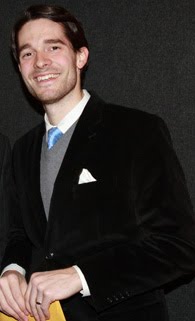 In this series of interviews, called Publishing Talks, I have been talking to book industry professionals about the future of publishing, books, and culture. This is a period of disruption and change for all media businesses. How will publishing evolve as our culture is affected by technology, climate change, population density, and the ebb and flow of civilization and its economics? Publishing Talks interviews help us understand the outlines of what is happening, and how we might ourselves interact with and influence the future of publishing as it unfolds.
In this series of interviews, called Publishing Talks, I have been talking to book industry professionals about the future of publishing, books, and culture. This is a period of disruption and change for all media businesses. How will publishing evolve as our culture is affected by technology, climate change, population density, and the ebb and flow of civilization and its economics? Publishing Talks interviews help us understand the outlines of what is happening, and how we might ourselves interact with and influence the future of publishing as it unfolds.
These interviews give people in the book business a chance to talk openly about ideas and concerns that are often only talked about “around the water cooler,” at industry conventions and events, and in emails between friends and they give people inside and outside the book industry a chance to hear first hand some of the most interesting and challenging thoughts, ideas and concepts being discussed by people in the book business.
I first read about the new literary agency, Movable Type Literary Group established by Jason Ashlock and his partner Meredith Dawson a few months ago. I’ve wondered for awhile now about the role of agents in the changing landscape of book publishing, and evidently so have Jason and Meredith. Along with an NEA based graph on their home page “Books are not dead,” they have composed the following statement of purpose and occasion:
“We have arrived, as Harold Bloom might say, belatedly.
The scene is established, the paradigms rigid, the machine stubborn and aging. Now more than half a millennium removed from the prima typographicae incunabula, “the first infancy of printing,” a chorus now announces the swift and coming death of the published word and the end of book history. But crisis and opportunity are concurrent, and the instability of one paradigm leads to the creation of another. We work in publishing at a moment of both belatedness and birth, when the trend of all future events is being determined. We aim, with many of our friends and colleagues, to confront the crisis of the moment and from the upheaval to design and shape a future.”
When I ran across Jason at a publishing event in Manhattan, we arranged to talk. I wanted to hear in his own words what this new agency will be all about. I think alot of what he says here will resonate for listeners of this podcast. Certainly, it makes sense for the role of the agent to be transformed, and to help lead the transformation of relationships between author, publisher and audience that is emerging now. It looks like Movable Type has an opportunity to create a new model for its own clients, and by example, for others as well. Maybe because, like many others looking at an established industry with new eyes, Jason Ashlock has an opportunity to create a new paradigm.
Podcast: Play in new window | Download
Publishing Talks: David Wilk interviews Morgan Entrekin
February 26, 2010 by David
Filed under PublishingTalks
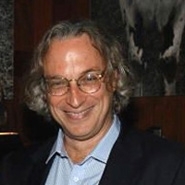 In this series of interviews, called Publishing Talks, I am talking to book industry professionals who have varying perspectives and thoughts about the future of publishing, books, and culture. This is a period of disruption and change for all media businesses.
Publishing has been a crucial part of human culture for as long as people have been writing and reading.
In this series of interviews, called Publishing Talks, I am talking to book industry professionals who have varying perspectives and thoughts about the future of publishing, books, and culture. This is a period of disruption and change for all media businesses.
Publishing has been a crucial part of human culture for as long as people have been writing and reading.
How will publishing evolve as our culture is affected by technology, climate change, population density, and the ebb and flow of civilization and its economics? Publishing Talks interviews help us understand the outlines of what is happening, and how we might ourselves interact with and influence the future of publishing as it unfolds. Publishing Talks interviews give people in the book business a chance to talk about ideas and concerns in a public forum that are often only talked about “around the water cooler,” at industry conventions and events, and in emails between friends.
I hope that Publishing Talks interviews will give people inside and outside the book industry a chance to hear about some of the thoughts, ideas and concepts that are currently being discussed by engaged individuals within the industry.
Morgan Entrekin is the iconic publisher of Grove Atlantic, one of the most prominent and successful midsized literary publishers of the past couple of decades. He has all the chops of a “traditional” book publisher: a great commitment to authors and their texts, a belief in the enduring power of a great backlist. But he is also an astute marketer who understands readers and the necessity for publishers to pay attention to what readers want and need.
Entrekin grew up in Nashville, graduated from Stanford in 1977, started in the business at Delacorte Press, working under the late, great Seymour Lawrence and editing the likes of Jayne Anne Phillips, Richard Brautigan, and Kurt Vonnegut. In 1982 he moved over to Simon & Schuster, where he made his name by championing, acquiring and editing Bret Easton Ellis’s breakout novel Less Than Zero. In 1984 he created his own imprint within Atlantic Monthly Press, Morgan Entrekin Books and a few years later he bought Atlantic outright; two years after that, he purchased Grove Press, which featured one of the great backlists that included D.H. Lawrence, Henry Miller, and Samuel Beckett.
Entrekin’s gained well deserved fame and credit for publishing Charles Frazier’s Cold Mountain in 1995. In the course of promoting the novel, Entrekin is credited with more or less creating the pre-publication tour, sending Frazier to meet book buyers in various cities before the book landed in stores. It paid off: Cold Mountain was a huge success, sold over 1.5 million copies, won the National Book Award, and was made into a big-budget Hollywood movie. Other notable Grove/Atlantic titles include Mark Bowden’s Black Hawk Down, Candace Bushnell’s Sex and the City, as well as the works of Sherman Alexie and P.J. O’Rourke.
We had a terrific talk, covering a wide range of interesting topics, from the current state of the book business, to the kinds of things that Entrekin is doing at Grove/Atlantic to stay current. Morgan is thoughtful, intelligent and incisive on every topic he discusses; he cares deeply about the books he publishes, backlist and frontlist titles alike, and is clearly still motivated and excited by the same beliefs and ideas that brought him into the book business in the first place. Anyone interested in understanding how a publisher can navigate the changing landscape of the business will benefit from listening to what he has to say in this interview.
Podcast: Play in new window | Download
Publishing Talks: David Wilk interviews Mark Coker, Founder of Smashwords
November 18, 2009 by David
Filed under PublishingTalks
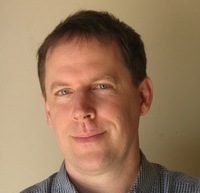 In this series of interviews, called Publishing Talks, I am talking to book industry professionals who have varying perspectives and thoughts about the future of publishing, books, and culture. This is a period of disruption and change for all media businesses. Publishing has been a crucial part of human culture for as long as people have been writing and reading. How will publishing evolve as our culture is affected by technology, climate change, population density, and the ebb and flow of civilization and its economics? Publishing Talks interviews help us understand the outlines of what is happening, and how we might ourselves interact with and influence the future of publishing as it unfolds.
In this series of interviews, called Publishing Talks, I am talking to book industry professionals who have varying perspectives and thoughts about the future of publishing, books, and culture. This is a period of disruption and change for all media businesses. Publishing has been a crucial part of human culture for as long as people have been writing and reading. How will publishing evolve as our culture is affected by technology, climate change, population density, and the ebb and flow of civilization and its economics? Publishing Talks interviews help us understand the outlines of what is happening, and how we might ourselves interact with and influence the future of publishing as it unfolds.
Publishing Talks interviews give people in the book business a chance to talk about ideas and concerns in a public forum that are often only talked about “around the water cooler,” at industry conventions and events, and in emails between friends. This series of talks will give people inside and outside the book industry a chance to hear about some of the thoughts, ideas and concepts that are currently being discussed by engaged individuals within the industry.
Mark Coker is the founder of Smashwords, an online publishing and distribution platform for ebooks. Smashwords publishes and distributes more than 4,000 original ebooks on behalf of 2,000 independent authors and 70 small publishers around the world. They have recently made distribution deals with Barnes & Noble and Indigo’s new Shortcovers program as well. I have recommended Smashwords to a number of authors and publishers who want to experiment with digital publishing.
Mark has been a long time technology entrepreneur. He talks here about the founding of Smashwords and why he started it. He has many interesting and valuable things to say about digital publishing and how technology is changing the future of books and reading. His approach to publishing is creative and usefully disruptive. You can read some of his thoughts in the new book section of Huffington Post, where he is blogging regularly.
Podcast: Play in new window | Download
William Gladstone: The Twelve (a novel)
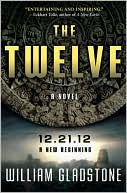 978-1593155568 – Hardcover – Vanguard Press – $19.95
978-1593155568 – Hardcover – Vanguard Press – $19.95
William Gladstone, author of the new novel, The Twelve, interviewed by Writerscast host David Wilk.
The Twelve is a terrific first novel by an experienced book industry professional, west coast based William Gladstone. I know the author personally, and I’ve read this novel at various stages of its development. In its final published form, it has become a compelling read on a subject of great interest to many people – the future. It’s a book with a strong spiritual message but one that does not get in the way of its fast moving and intriguing story.
The publisher’s description of the book goes like this: “The Twelve is an extraordinary and unforgettable novel about a most unusual man. As a child, Max lives in a world of colors and numbers, not speaking until the age of six. As an adult, Max ventures on a journey of destiny to discover the secret behind the ancient Mayan prophecy about the “end of time,” foretold to occur on December 21, 2012.
When he is fifteen years old, Max has a near death experience during which he has a vision that reveals to him the names of twelve unique individuals. While Max cannot discern the significance of these twelve names, he is unable to shake the sense that they have deep meaning. Eight years pass before Max meets the first of the twelve.
With this, Max’s voyage of discovery begins, as he strives to uncover the identities and implications of “the twelve”—individuals he will meet during his journey towards truth, all of whom seem connected, and all of whom may hold the answer to what will happen at the exact moment the world may end. The novel takes the reader on a series of global adventures, culminating in a revelation of why and how Max and the twelve are destined to unite to discover the magnitude of the meaning of December 21, 2012. Only the twelve can provide the answers, as the fate of all humanity rests in the balance.”
In my fast-paced interview with author Gladstone, we talk about the genesis of the novel, his sense of the meaning of the book, and what the future holds for humanity.
Podcast: Play in new window | Download
James Gustav Speth: The Bridge at the Edge of the World: Capitalism, the Environment, and Crossing from Crisis to Sustainability
August 30, 2009 by David
Filed under Non-Fiction
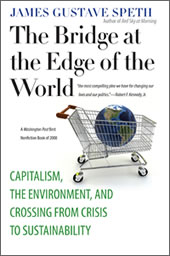 978-0300151152 – paperback – Yale University Press – $18.00
978-0300151152 – paperback – Yale University Press – $18.00
While I was reading The Bridge at the Edge of the World, I often would exclaim out loud as so many of the ideas the author talks about are ones I believe in and feel are important to the dialog about the future of our planet. This is an important book that should be widely read, discussed and used as the basis of action – and soon!
Co-founder of the NRDC, former Yale University dean, and former White House advisor James Gustave Speth has been a leader in the environmental movement for more than 30 years.
Now, faced with overwhelming evidence of galloping degradation of the planet, Speth has concluded that the environmental project—his project—has failed. No matter how hard environmentalists work, the current of destruction against which they are swimming is simply too swift. In order to preserve a livable planet for future generations, Speth argues in The Bridge at the Edge of the World that the current itself must be altered. And the current is that untouchable edifice, American-style consumer capitalism.
I found this book to be powerful and compelling and wanted to talk to “Gus” Speth about the implications of his thinking. How should we go forward when we know that the way we live today is putting us on a collision course with the natural world? How do we build new ways of living that are sustainable? And how are we going to do this in the face of so many entrenched interests that will oppose the essential changes we feel are necessary for human survival and for the preservation natural systems in a viable planet earth?
While this interview is perhaps all too brief, Speth talks in depth about some of his ideas and answers my questions with his typical incisiveness and intelligence.
Podcast: Play in new window | Download
